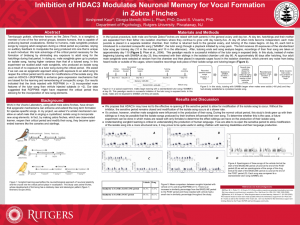Kaur, Airshpreet: Inhibition of HDAC3 Modulates Neuronal Memory for Vocal Formation in Zebra Finches
Title: Inhibition of HDAC3 Modulates Neuronal Memory for Vocal Formation in Zebra Finches
Name: Airshpreet Kaur
Major: Biological Sciences
School affiliation: Douglass Residential College,School of Environmental and Biological Sciences
Programs: Aresty – Research or Conference Funding Recipient
Other contributors: Giorgia Merolli, Mimi L. Phan, David S. Vicario
Abstract: Taeniopygia guttata, otherwise known as the Zebra Finch, is a songbird, a member of one of the few animal groups, besides humans, that is capable of producing learned vocalizations. Similar to humans, male songbirds produce songs by copying adult caregivers during a critical period as juveniles, relying on auditory feedback to manipulate the song produced into one that is unique to each individual. We took advantage of the critical period necessary for the formation of birdsong by eliminating any exposure to adult song for the hatchlings during that period. In doing so, male songbirds grew up to produce an isolate song, having higher variance than that of a tutored song. In this experiment we studied adult male songbirds, who produced an isolate song as a result of no exposure to a tutor song during the critical period. We asked if we can use an epigenetic approach along with exposure to an adult song to reopen the critical period and to allow for modifications of the isolate song. We used an HDAC3-I (RGFP966) to enhance gene expression mechanisms that are biased for the learning and remembering of conspecific songs. Our results indicated that the birds injected with RGFP966 (n = 2) incorporated more features of the tutor song than vehicle injected subjects (n =2). Our data suggested that RGFP966 might have reopened the critical period thus allowing for the incorporation of new song elements.
